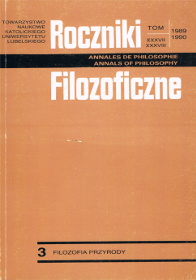Evolution of Views of Ernest Nagel on Explanation
Abstract
The paper presents the changes in views of one of the creators of the law-covering model. I distinguish and discuss five periods in which Nagel’s works on explanation were published:
1. Formulation of his primary views /1934-1943/
2. Studies on reduction /1949-about 1952/.
3. Analysis of functional explanations /1953/.
4. Comprehensive view on explanation /1957-1961/. /4.1/ I distinguish three stages in Nagel’s explication of the notion of explanation: In the first one /4.1.1/, explanation is treated as an answer to the question "why?". In the second one /4.1.2/, Nagel tries to sketch the possible contexts of explanation by examples. In the third stage /4.1.3/ Nagel groups the examples in four types of explanation. I complete that explication by general requirements for the explanations /4.2/. I discuss the classifications of explanations /4.3/ and the deductive model, probabilistic, genetics and functional explanations /4.4-4.7/ and a theory as a system of explanations /4.9; some aspect of the instrumentalism/.
5. Defence and modifications of his previous views /1968-1977/.
6. In recapitulation I collect persistent views of Nagel /6.2/: /I/ There are not radically differences between domains of science. /2/ Explanation is an answer to the question /in general: "why?"/. The deductive model is an ideal of explanation. /6.3/ Some of Nagel’s are subject to change: /I/ The Nagel’s publications past 1961 także "history of science" into account. /2/ They are three phases of Nagel’s views on reduction and teleological explanation: /a/ first view /1949-1953/; /b/ second view /1957-1961/; it is the development of /a/; /c/ third view /1968-1977/; that view has thesis incompatible with /a/ and /b/; third view of teleology has more continuations than third view of reduction. /6.4/ The paper postulates /I/ a study of basis views of Nagel, /2/ analysis of changes of views of philosophers which are related to Nagel, /3/ a study of problem of change of scientific end philosophical views.
Copyright (c) 1990 Roczniki Filozoficzne

This work is licensed under a Creative Commons Attribution-NonCommercial-NoDerivatives 4.0 International License.





